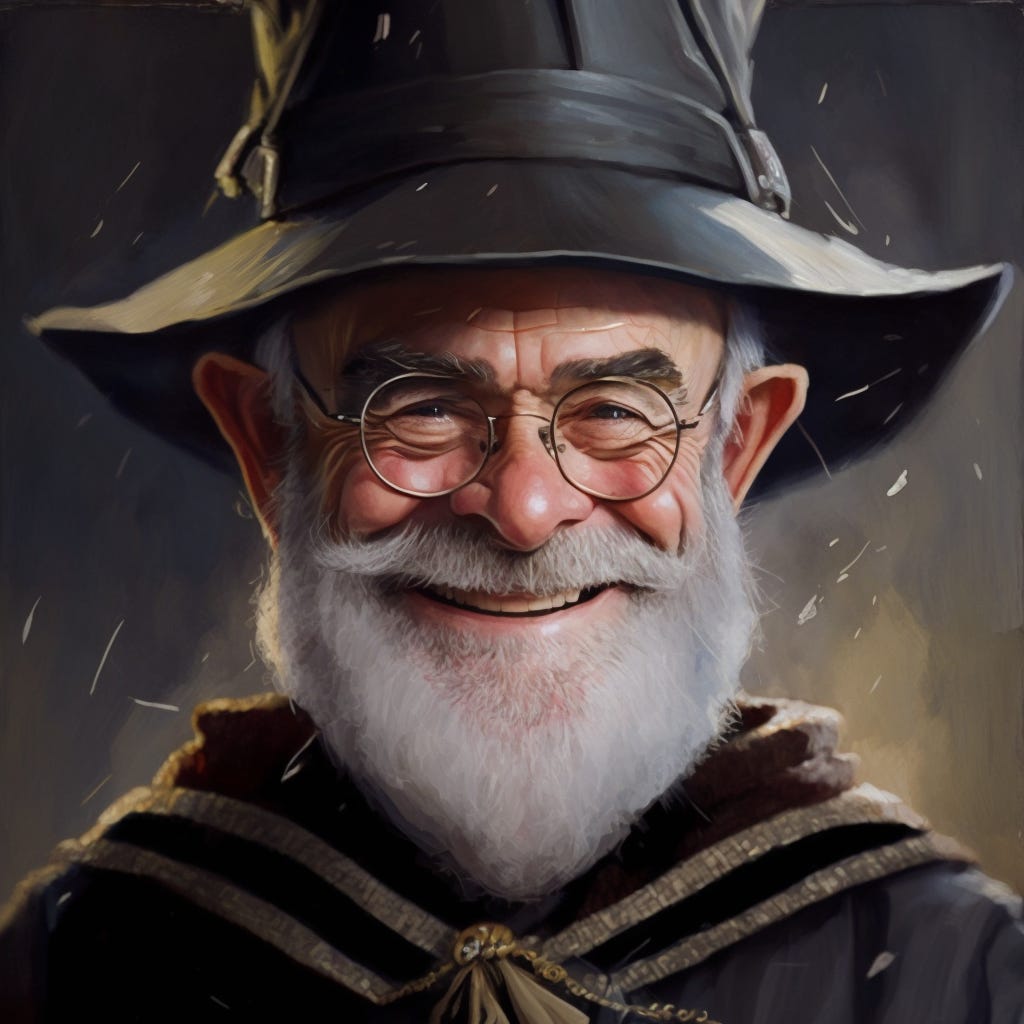Why I'm Re-Reading Terry Pratchett's Discworld
Introduction to the Series
I was ten or eleven years old when I first discovered Discworld. After devouring an ancient paperback edition of The Colour of Magic that I’d stumbled across in the local library, I spent more than a decade obsessed with Pratchett’s creation. I knew whole sections of the books by heart; I spent the money from my paper-round (a princely £6 a week) joining all the fan clubs I could find; and, when a new book came out, I begged and bothered bookstores to keep the promotional posters aside for me after the launch (to be installed, somehow, in the few remaining inches of bedroom space not already coated with Discworld memorabilia).
I loved Discworld not only for its incredible stories and because it made me laugh harder than I ever had before, but because it made me think in new – sometimes uncomfortable – ways about who we are and how we make sense of the world.
Pratchett’s novels were incredibly funny, strange, and playful, and so the literary critics hated him. They dismissed his books as frivolous and silly – as mere pun-laden pastiche. Millions of readers like me thought otherwise. He’s now widely hailed as one of the finest writers of the century, but his genius as both writer and acute observer of the human condition went unrecognised for decades.
He wrote Fantasy – in the critics’ view, the lowest tier of ‘genre’ fiction. But Pratchett used that fantasy backdrop and his razor-sharp wit to explore what it means to be human. He held a mirror up to our nature and played with the warped and colourful images he saw in the reflections. He gleefully exposed humanity’s contradictions and self-deceptions, our weakness for prejudice and ideology… and so much more besides.
‘Why do you go away? So that you can come back. So that you can see the place you came from with new eyes and extra colours… Coming back to where you started is not the same as never leaving’.
Terry Pratchett, A Hat Full of Sky
Time moved on, and so did I. I went to university and eventually studied for a PhD in History. I never disowned Discworld and certainly didn’t consider I’d ‘grown out’ of it, but it simply wasn’t part of my life anymore.
Except, of course, that it was. Even if I wasn’t reading the books anymore, Terry Pratchett’s world had found its way into the source-code of my unconscious.
My PhD was all about Soviet humour – exploring the jokes ordinary people told each other to help cope with, and make sense of, their harsh and difficult lives. Under Stalin’s dictatorship, cracking the wrong kind of joke could easily see you torn from your family and sent to a brutal prison camp for 10 years. But people still took the risk. Like Terry Pratchett, these ordinary people couldn’t help exposing the often vast (and hilarious) disconnect between what life is supposed to be, and what we actually experience day to day. (If you’re interested, this later became a book.)
Humour that helps make sense of a world in which wild fantasies constantly butt heads with stubborn realities… sound familiar? As I sat in the Russian archives, using jokes to help make sense of a world so different from my own, I couldn’t help thinking about Discworld.
Time and again, Terry Pratchett showed us that, in the perceptive words of Nick Cave:
Humour is the way in which we manoeuvre ourselves through the things that are difficult to talk about … True humour is the antidote to dogmatism and fanaticism.1
Whether it’s on Discworld, in our own lives, or even under a totalitarian regime, humour helps us to speak truth to power, but also – and more importantly – to ourselves.
Discworld may be wildly exaggerated in many respects, but the greatest satirists and comedians are the ones who use wild, taboo-filled humour to smuggle important ideas into our minds. Sometimes we learn best through laughter. It disarms us, even as it cuts through our assumptions and shakes up our thinking.
I imagine that I’ll bring some of the skills I’ve developed during my studies to this project, but this is far from an academic exercise.
Coming back to Terry Pratchett’s Discworld is about coming home; home to the stories and ideas which have continued to shape me throughout my adult life.
But I’m not just looking for a shot of warm, fuzzy nostalgia – this time I want to see Discworld with new eyes and in far more colours than I was able to appreciate before.
As I began the project, I was not only relieved, but frequently delighted and left speechless, by just how deep, complex and nuanced these books are. And I realised that, as a youngster, I’d only been able to hear a muffled version of Discworld; going back has proved such a joy because now I can hear and appreciate so much more of the orchestra.
I hope you’ll join me on this journey of rediscovery.
Just click below to get started with the first article: Guards! Guards!
Where to Begin?
I’m not going to start at book one. Why? Because Terry Pratchett told me not to.
In his Guest of Honour address to the 2004 World Science Fiction Convention, he told the audience that:
I find it now rather embarrassing that people beginning the Discworld series start with The Colour of Magic and The Light Fantastic, which I don’t think are some of the best books to start with.
This is the author saying this, folks. Do not start at the beginning with Discworld.2
Unsurprisingly, he’s not wrong. The first few Discworld novels are much simpler and arguably we have to wait until Mort (book 4) or later to get our teeth into a real plot.
All of which gives me an excellent excuse to start with the eighth Discworld novel, Guards! Guards!, which introduces my favourite sub-series: the City Watch.
So that I’m able to talk in detail about the books – and particularly about how major characters change and develop over time – there will be spoilers throughout. The final Discworld novel (The Shepherd’s Crown) came out in 2015, and I’ll be starting with Guards! Guards! which was published in 1989, so there’s been plenty of time to read them.
So, consider this fair warning and decide for yourselves if you want to read or avoid particular articles. I certainly don’t want to spoil the fun for anyone; on the contrary, with this series I want to add to it by diving deeply into each Discworld novel.
Nick Cave, The Red Hand Files #75: https://www.theredhandfiles.com/funniest-writers-out-there/
Quoted in Rob Wilkins, Terry Pratchett: A Life with Footnotes (London, 2022), pp.194-5.






